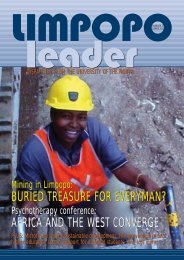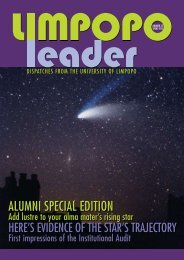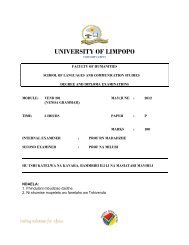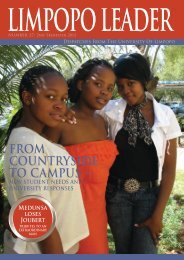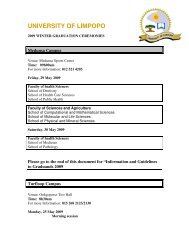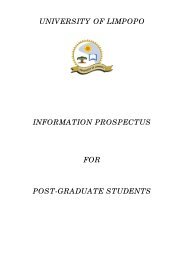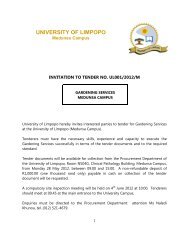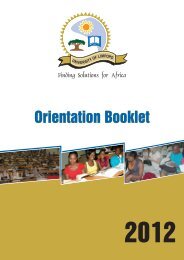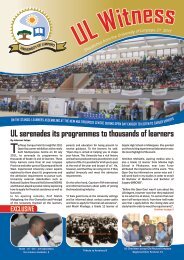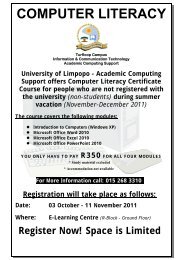Limpopo Leader - Spring 2005 - University of Limpopo
Limpopo Leader - Spring 2005 - University of Limpopo
Limpopo Leader - Spring 2005 - University of Limpopo
You also want an ePaper? Increase the reach of your titles
YUMPU automatically turns print PDFs into web optimized ePapers that Google loves.
Sky Mkuti, Goldmarks Makamure, Tapiwa Zvenyika<br />
majoring in international politics. Third member <strong>of</strong><br />
UNILISA’s executive is treasurer Goldmarks Makamure,<br />
a final-year psychology student from Masvingo in<br />
Zimbabwe.<br />
‘We found,’ they said, ‘that there were many issues<br />
where international students needed to be<br />
represented. There was no organisation to do this,<br />
so we formed one.’<br />
So UNILISA came into being in 2004 to assist with<br />
the integration <strong>of</strong> international students into the local<br />
scene, both socially and academically. The<br />
Association organises gatherings and social functions,<br />
as well as independence-day celebrations for each <strong>of</strong><br />
the countries represented on campus. There are moves<br />
afoot to make contact with international students on<br />
the Medunsa campus soon.<br />
‘We’re proud to be here at <strong>Limpopo</strong>,’ the UNILISA<br />
executive said. ‘The university has good academic<br />
standards and infrastructure. Particularly the libraries<br />
and the computer equipment,’ they added.<br />
The various academic staffs on the two <strong>Limpopo</strong><br />
campuses have been drawn from as many parts <strong>of</strong> the<br />
continent as the students. The best way <strong>of</strong> finding this<br />
out is to become a regular reader <strong>of</strong> <strong>Limpopo</strong><br />
<strong>Leader</strong>, but listen to just two academics talking<br />
about themselves and the <strong>University</strong>’s many-sided<br />
African connections.<br />
At Medunsa, here’s Pr<strong>of</strong>essor Gboyega<br />
Ogunbanjo, a smiling and friendly man from Nigeria<br />
(now a naturalised South African) who is currently the<br />
Deputy Dean (research) in the Faculty <strong>of</strong> Medicine.<br />
His speciality is Family Medicine, and he talks<br />
enthusiastically about initiatives in this field in the<br />
Democratic Republic <strong>of</strong> Congo (DRC) and Kenya.<br />
Four family physicians from the DRC have qualified<br />
with the Family Medicine master’s degree from<br />
Medunsa The Family Medicine training programme<br />
was initiated by the evangelical churches operating in<br />
the DRC with input from the Department <strong>of</strong> Family<br />
Medicine and Primary Health Care at Medunsa.<br />
The churches run the mission hospitals where most<br />
rural doctors work. This relationship hopefully will lead<br />
to the establishment <strong>of</strong> family medicine postgraduate<br />
courses being <strong>of</strong>fered at the Kisangani and Kinshasa<br />
medical schools. The present relationship between<br />
Medunsa and the DRC evangelical churches is<br />
supported by funding from the Belgian government.<br />
Medunsa has also helped to establish a Department<br />
<strong>of</strong> Family Medicine at Moi <strong>University</strong> in the west<br />
Kenyan city <strong>of</strong> Eldoret.<br />
Ogunbanjo shakes his head when asked about<br />
joint research projects with these East and Central<br />
African institutions. ‘The main problem has been lack<br />
<strong>of</strong> resources for research in most parts <strong>of</strong> Africa. That’s<br />
why these linkages with Medunsa are so important.<br />
‘It’s a similar situation at Medunsa with its recent<br />
merger with the <strong>University</strong> <strong>of</strong> the North. I see real<br />
opportunities developing through the cross-pollination<br />
<strong>of</strong> ideas and projects between the various faculties<br />
and disciplines. Medunsa was the only medical<br />
university in the whole <strong>of</strong> Africa. We have suffered<br />
from this alienation and from the influence <strong>of</strong> other<br />
faculties. So the merger makes good sense – even<br />
though the distance between the two campuses<br />
presents a real challenge at this stage.’<br />
Ogunbanjo was born in Lagos in 1958. He did his<br />
undergraduate training and internship at the <strong>University</strong><br />
<strong>of</strong> Lagos, and then completed his one-year national<br />
service at Badagry General Hospital, a rural hospital<br />
near the Benin border. This experience opened his<br />
eyes to rural realities and needs. After four years,<br />
Nigeria launched their Technical Aid Programme to<br />
Africa and the Caribbean. Ogunbanjo jumped at the<br />
opportunity <strong>of</strong> working abroad, and very soon found<br />
himself doctoring in war-torn Mozambique.<br />
‘I was based in Maputo,’ he recalls. ‘It was pretty<br />
P A G E 7



